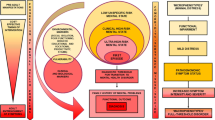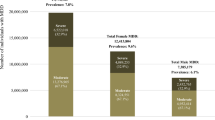Abstract
Effective screening in primary care among asylum-seekers in the US is critical as this population grows. This study aimed to evaluate disease prevalence and screening methods in this high-risk group. Two hundred ten new clients from 51 countries, plus Tibet, who were accepted into a program for asylum seekers from 2012 to 2014 were included. Screening rates and outcomes for infectious, non-communicable, and mental illnesses were evaluated. Screening rates were highest for PTSD, depression, hepatitis B, and latent tuberculosis. Seventy-one percent of clients screened positive for depression and 55 % for PTSD, followed by latent tuberculosis (41 %), hypertension (10 %), hepatitis B (9.4 %), and HIV (0.8 %). Overall screening rates were high. Point of care testing was more effective than testing that required a repeat visit. A large psychiatric and infectious disease burden was identified. These findings can inform future primary care screening efforts for asylum seekers in the US.
Similar content being viewed by others
References
US Department of State, Bureau of Population, Refugees and Migration, Refugee Admission Statistics. http://www.state.gov/j/prm/releases/statistics (2015). Accessed 28 September 2016.
Asylum Trends 2012: Levels and Trends in Industrialized Countries, UNHCR, 2013. http://www.unhcr.org/5149b81e9.html. Accessed 28 September 2016.
European Commission, Asylum and Migration Glossary 3.0, October 2014. http://ec.europa.eu/dgs/home-affairs/what-we-do/networks/european_migration_network/docs/emn-glossary-en-version.pdf. Accessed 28 September 2016.
Tafuri S, Prato R, Martinelli D, Melpignano L, De Palma M, Quarto M, Germinario C. Prevalence of Hepatitis B, C, HIV and syphilis markers among refugees in Bari, Italy. BMC Infect Dis. 2010;10:213.
McCarthy AE, Weld LH, Barnett ED, So H, Coyle C, Greenaway C, et al. Spectrum of illness in international migrants seen at geosentinel clinics in 1997–2009, part 2: migrants resettled internationally and evaluated for specific health concerns. Clin Infect Dis. 2013;56:925–33. doi:10.1093/cid/cis1016.
Chai SJ, Davies-Cole J, Cookson ST. Infectious disease burden and vaccination needs among asylees versus refugees, District of Columbia. Clin Infect Dis. 2013;56:652–8. doi:10.1093/cid/cis927.
Moreno A, Crosby S, Labelle C, Sullivan M, Samet JH. Helath assessment of HIV-infected refugees. J Acquir Immune Defic Syndr. 2003;34(2):251–4.
Murray CJL, Lopez AD. Measuring the global burden of disease. N Engl J Med. 2013;369:448–57.
Tamblyn JM, Calderon AJ, Combs S, O’Brien M. Patients from abroad becoming patients in everyday practice: torture survivors in primary care. J Immigr Minor Health. 2011;13(4):798–801.
Rasmussen A, Smith H, Keller AS. Factor structure of PTSD symptoms among West and Central African refugees. J Trauma Stress. 2007;20(3):271–80. doi:10.1002/jts.20208.
Johnson H, Thompson A. The development and maintenance of post-traumatic stress disorder (PTSD) in civilian adult survivors of war trauma and torture: a review. Clin Psychol Rev. 2008;28:36–47. doi:10.1016/j.cpr.2007.01.017.
Fazel M, Wheeler J, Danesh J. Prevalence of serious mental disorder in 7000 refugees resettled in western countries: a systematic review. Lancet. 2005;365(1):1309–14. doi:10.1016/S0140-6736(05)61027-6.
Kandula NR, Kersey M, Lurie N. Assuring the health of immigrants: what the leading health indicators tell us. Annu Rev Public Health. 2004;25:357–76.
Scotto G, Saracino A, Pempinello R, El Hamad I, Geraci S, Panunzio M, Palumbo E, Cibelli DC, Angarano G. Simit epidemiological multicentric study on hospitalized immigrants in Italy during 2002. J Immigr Health. 2005;7(1):55–60.
Rasmussen A, Crager M, Keatley E, Keller AS, Rosenfeld B. Screening for torture: a narrative checklist comparing legal definitions in a torture treatment clinic. Z Psychol. 2011;219(3):143–9.
Hollifield M, Warner TD, Lian N, Krakow B, Jenkins JH, Kesler J, et al. Measuring trauma and health status in refugees: a critical review. JAMA. 2002;288(5):611–21. doi:10.1001/jama.288.5.611.
Catherine M, Fawzi S, Pham T, Lin L, Nguyen TV, Ngo D, et al. The validity of posttraumatic stress disorder among Vietnamese refugees. J Trauma Stress. 1997;10(1):101–8. doi:10.1023/A:1024812514796.
Hollander A-C, Ekblad S, Mukhamadiev D, Muminova R. The validity of screening instruments for posttraumatic stress disorder, depression, and other anxiety symptoms in Tajikistan. J Nerv Ment Dis. 2007;195(11):955–8. doi:10.1097/NMD.0b013e318159604b.
Kleijn WC, Hovens JE, Rodenburg JJ. Posttraumatic stress symptoms in refugees: assessments with the Harvard Trauma Questionnaire and the Hopkins symptom checklist-25 in different languages. Psychol Rep. 2001;88(2):527–32. doi:10.2466/pr0.2001.88.2.527.
Lhewa D, Banu S, Rosenfeld B, Keller A. Validation of a Tibetan translation of the Hopkins Symptom checklist 25 and the Harvard Trauma Questionnaire. Assessment. 2007;14(3):223–30. doi:10.1177/1073191106298876.
Mollica RF, Caspi-Yavin Y, Bollini P, Truong T, Tor S, Lavelle J. The Harvard Trauma Questionnaire. Validating a cross-cultural instrument for measuring torture, trauma, and posttraumatic stress disorder in Indochinese refugees. J Nerv Ment Dis. 1992;180(2):111–6. Retrieved from http://www.ncbi.nlm.nih.gov/pubmed/1737972.
Shoeb M, Weinstein H, Mollica R. The Harvard trauma questionnaire: adapting a cross-cultural instrument for measuring torture, trauma and posttraumatic stress disorder in Iraqi refugees. Int J Soc Psychiatry. 2007;53(5):447–63. doi:10.1177/0020764007078362.
Kroenke K, Spitzer RL. The PHQ-9: a new depression diagnostic and severity measure. Psychiatric Annals. 2002;32(9):509–15.
Kroenke K, Spitzer RL, Williams JBW. The PHQ-9: validity of a brief depression severity measure. J Gen Intern Med. 2001;16(9):606–13. doi:10.1046/j.1525-1497.2001.016009606.x.
Rasmussen A, Verkuilen J, Ho E, Fan Y. Posttraumatic stress disorder among refugees: measurement invariance of Harvard Trauma Questionnaire scores across global regions and response patterns. Psychol Assess. 2015;27(4):1160–70. doi:10.1037/pas0000115.
Bertelsen NS, DallaPiazza M, Hopkins MA, Ogedegbe G. Teaching global health with simulations and case discussions in a medical student selective. Global Health. 2015;11:28. doi:10.1186/s12992-015-0111-2.
Acknowledgments
The authors wish to thank Tenying Yangsel, Avazeh Attari, Lillian Perdomo, Sarah Rosenbaum, M.D., Sowmya Josyula, M.D. and Andrew Rasmussen, Ph.D., for their invaluable contributions to this project at PSOT. Funding was provided by Merrin Faculty Development Program, Program for Medical Education and Innovation Research, New York University School of Medicine (US).
Author information
Authors and Affiliations
Corresponding author
Ethics declarations
Conflict of Interest
The authors report no conflicts of interest.
Rights and permissions
About this article
Cite this article
Bertelsen, N.S., Selden, E., Krass, P. et al. Primary Care Screening Methods and Outcomes for Asylum Seekers in New York City. J Immigrant Minority Health 20, 171–177 (2018). https://doi.org/10.1007/s10903-016-0507-y
Published:
Issue Date:
DOI: https://doi.org/10.1007/s10903-016-0507-y




